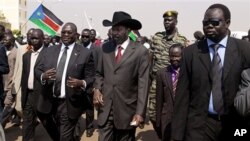South Sudan’s chief of mission to the United States and United Nations has called on militia groups to lay down their arms and join his government. He says continued fighting risks destabilizing the region, ahead of south Sudan’s independence scheduled for July.
This came after South Sudanese officials say the army has killed at least 55 rebel fighters during a clash in volatile Jonglei state. Hundreds have died in fighting between the southern army and various armed groups since January, when southern Sudan voted to split from the north.
Southern leaders accused the north of using the rebellions to destabilize the region ahead of independence in early July.
Ezekiel Lol Gatkuoth, who is also a member of the ruling council of the Sudan People’s Liberation Movement (SPLM), says his government is ready to negotiate with the militias.
“It has been our desire to have peace in Sudan and especially in southern Sudan. And that is what we have been telling the militias to come and join us so that we can actually build this new nation,” said Gatkuoth.
“We have plenty of natural resources including oil and a vast land. That is why we have been calling upon them [militia groups] so that they can be integrated into the SPLA [Sudan People’s Liberation Army] and become part of the new army we are going to have come July 9,” he added.
The latest fighting raged for several hours Saturday, as soldiers battled gunmen led by Gabriel Tanginya, the former head of a pro-Khartoum militia during Sudan's long north-south civil war.
Tanginya agreed late last year to integrate his fighters into the southern army. Media reports say Saturday's fighting began after the militiamen refused to report to the southern capital of Juba. Officials say five of Tanginya's generals were killed in the clash.
Gatkuoth says the Government of Southern Sudan is doing its best to integrate the militias into the military.
“Their concerns are being addressed, because the concerns of a soldier are to be recognized..and that’s [exactly] what we are doing,” said Gatkuoth.
He said there may be other factors motivating the armed groups to continue fighting in the south:
“I don’t think it is [just about] their concerns [regarding integration into the larger military]; it is about allowing themselves to be used by [outside forces] who are not interested in having peace in southern Sudan,” he said.
“As a nation,” he continued, “we are committed to protecting our civilians, and we will confront anybody who is jeopardizing the national security of southern Sudan.”




